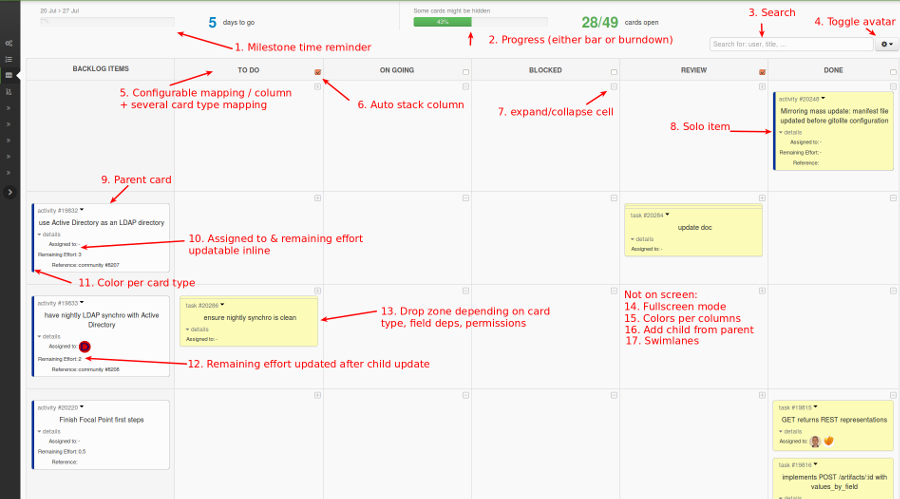This epic describes the top level objectives of Cardwall v2.
Functional objectives
The objective is to offer a superset of current cardwall features, hence re-implementing all features, fixing current limits and add new behaviours.
Status of cardwall v1

On the 17 features of cardwall v1, most are useful for day to day work but some needs to be reworked / extended:
- Card stacking should be replaced by "Collapse columns" (replace feature 6. and 7.) as well as collapsable Swimlanes
- Card color is based on "type" field decorator in Cardwall v1 but in Kanban it's based on Tracker color. This should be homogenized. Maybe keep card type but add a little "color dot" with tracker color next to tracker name ?
- Card should be fully updatables (not only assigned_to and remaining effort) and a special attention is needed to make is easy (it might be complex to get the focus right now)
New behaviours
Improvement of current design:
- Real time update: With usage of AngularJS, there is less need of cardwall refresh so it increase the risk of board data being out-dated (ie. cards moved in other cells, changed values, etc).
- Burndown should be part of cardwall information (fullscreen or not) and their shouldn't be a need of a dedicated pane to see it in full size.
- Scrum planning (aka Task break down), the teams wants to break down stories or create new stories easily on cardwall (as it's done on kanban).
- Administration: management and re-ordering of columns should be eased to avoid having to clear everything everytime we need a change.
- The should be different views of the cards to have a more compact/condensed view (as it's done on planning v2)
- Search should work on all fields
- Teams want to have different grouping of informations. For instance, for a shared board of a team in 3 locations (Paris, Montreal and Tokyo), the team want to group all the user stories based on team location.
Fundamental changes:
- For big projects, a given release backlog (ie. a 6 month worth of backlog) can be split in different teams (5 to 10) with different ways of working. Each of those teams will run several sprints to implement all the stories in the backlog. Tuleap should be able to support different cardwall for teams.
Technical objectives
Leverage on AngularJs and Kanban board to have an homogene experience between the 2 agile systemes of Tuleap. However, Kanban and Cardwall have quite different business rules so we will not have 1 board for 2 systems. Instead, we will try to extract common componenet into reusable, shared libraries. As of today, what can be easily shared:
- Modal for artifact edition
- Card rendering (and in future, inline edition)
Re-use REST routes to simplify implementation and increase testability.